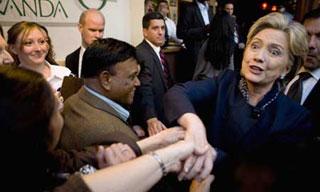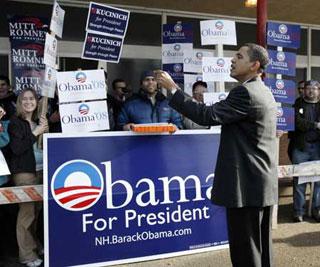World
Unions bitterly divided in Democratic race
Source: Xinhua | 01-14-2008 08:22
LOS ANGELES, Jan. 13 (Xinhua) -- The tight race between Hillary Rodham Clinton and Barack Obama has opened surprisingly deep and bitter divisions in the ranks of organized labor, it was reported on Sunday.
 |
| US Democratic presidential candidate Sen. Hillary Clinton (D-NY) greets supporters after a roundtable discussion at Bertha Miranda's Mexican Restaurant in Reno Jan. 12, 2008. (Xinhua/Reuters Photo) |
Though unions have divided over presidential candidates in the past, labor insiders say the closeness of the Clinton-Obama race has made this year's divisions unusually bitter, the Los Angeles Times said.
The past few days have seen rival union leaders flying planeloads of last-minute volunteers into key states, accusing each other of trying to disenfranchise members, and even launching open attacks on rival Democratic candidates, the paper said.
In Nevada, unions backing Clinton are crying foul because some caucuses will be in casinos and hotels where a pro-Obama union's members predominate -- helping that union's members and potentially discouraging others.
Interunion tension may be most visible in Nevada, where Clintonand Obama hope for gains after splitting Iowa and New Hampshire. And Nevada, which this year will be the third state to select Democratic delegates, ranks among the most unionized Western states with more than 13 percent of all workers belonging to labor organizations.
Meanwhile, inside the American Federation of State, County and Municipal Employees (AFSCME), which has endorsed the New York senator and is leading the charge for her in Nevada, several officers are protesting the union's decision to run negative ads against Obama, the Illinois senator.
Organized labor is probably the single-most important part of the Democratic Party's election machinery, providing thousand of campaign workers and millions of dollars for sophisticated get-out-the-vote efforts and others.
It has also made the process much more expensive and thus raised the stakes for union leaders and their members.
 |
| Democratic presidential candidate Senator Barack Obama (D-IL) thanks supporters of his campaign after delivering coffee and doughnuts to them at the Jewett Street School polling place in Manchester, New Hampshire, Jan. 8, 2008, on the day of the New Hampshire Primary. (Xinhua/Reuters Photo) |
Many labor leaders say this year's competition is healthy, a sign of how badly Democrats want to retake the White House. They predict unions' support for the Democratic nominee will be all the stronger in November.
Democrats' hostility toward the Bush administration is a powerful force for unity. But pre-nomination splits have not always healed. In 1980, when Sen. Edward M. Kennedy of Massachusetts challenged President Jimmy Carter for the party's nomination, the split contributed to Ronald Reagan's victory. And Richard Nixon defeated Hubert Humphrey after Democrats split over the Vietnam War.
If Obama becomes the nominee, "it could dampen enthusiasm" among Clinton's union backers because of gnawing public disagreements, said Lawrence R. Scanlon Jr., the political director of the AFSCME, which had already flown 100 paid organizers to Nevada and planned to add 100 more, according to The Times.
Editor:Zhang Pengfei



